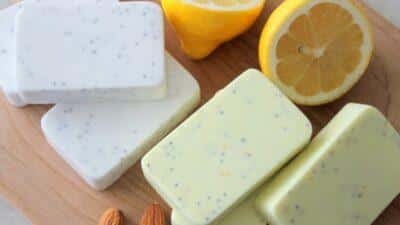|
Listen To The Article
|

Image source: theselfsufficientliving.com
Congress is cracking down on homemade soap [1].
Yep, Senators Dianne Feinstein and Susan Collins, in their infinite wisdom, are concerned that the health of Americans will be impacted by handmade soaps and cosmetics that are made from all-natural products.
The Personal Care Products Safety Act, as their bill is called, would strengthen the Food and Drug Administration’s (FDA) authority to regulate the ingredients in personal care products – not only the name-brand ones made by big companies but also the homemade products such as all-natural soap made in home businesses across America.
Although most bills that are introduced don’t become law, this one has a solid chance. That’s because Feinstein and Collins have received endorsements on the bill from the biggest names in the cosmetics business: Johnson & Johnson, Procter & Gamble, Revlon, Estee Lauder, Unilever and L’Oreal.
Federal regulations on cosmetics have not been updated in 75 years, the senators say.
Everything You Need To Know To Become A Self-Sufficient Homeowner [2]
“From shampoo to lotion, the use of personal care products is widespread, however, there are very few protections in place to ensure their safety,” Feinstein said. “Europe has a robust system, which includes consumer protections like product registration and ingredient reviews. I am pleased to be introducing this bipartisan legislation with Senator Collins that will require FDA to review chemicals used in these products and provide clear guidance on their safety. In addition, the legislation has broad support from companies and consumer groups alike.”
The Personal Care Products Safety Act would mandate that all cosmetic businesses complete government registration forms and detail each ingredient used.

Image source: soapandcandledelight.com
The Handmade Cosmetic Alliance (HCA), which represents more than 300,000 small handmade cosmetic companies throughout the US, opposes the bill, saying it “imposes burdensome fees, registration requirements and reporting mandates” that will “jeopardize” handmade cosmetic companies in the US.
“The HCA along with other handmade cosmetic organizations support efforts to make meaningful policy changes to enhance cosmetic safety,” said Debbie May, executive director of the HCA. “However, subjecting small handmade cosmetic companies which operate with less than a handful of employees to onerous regulation is not only unfair and unprecedented, but creates regulatory requirements that will force businesses to close their doors.”
New Survival Seed Bank™ Lets You Plant A Full Acre Crisis Garden! [3]
HCA said small businesses “primarily use food-grade ingredients that can, and often are, purchased in local grocery stores.”
“Handmade cosmetic companies should be exempt from product registration and ingredient filings with the FDA since handmade products already bear labels with all ingredients listed,” HCA said.
Specifically, HCA said there should be exemptions for small business with average sales of less than $2 million per year. Small farms and business were exempt from the Food Modernization and Safety Act, and small cosmetic companies should be exempt from the latest bill, HCA said.
Big companies have enough money to pay for extra regulations. Small businesses often do not.
“Yet, the little guy–the competition–often works on a shoestring and doesn’t have the support or robust finances to endure these regulations,” wrote Julie Gunlock at the Independent Women’s Forum website. “And so these companies are often the ones really hurt by these unnecessary regulations.”
Both sides say the bill has some good points. Among them, it would require the FDA to test the safety of the five most common chemicals found in all cosmetic products, including those used by big business. Initially, the bill would require the FDA to study the safety of quaternium-15, diazolidinyl urea, propyl paraben, lead acetate and methylene glycol/formaldehyde.
Do you support a crackdown on the all-natural cosmetic industry? Should small businesses be exempt? Share your thoughts in the section below:
All You All-Natural? Harness The Power Of Nature’s Most Remarkable Healer: Vinegar [4]
